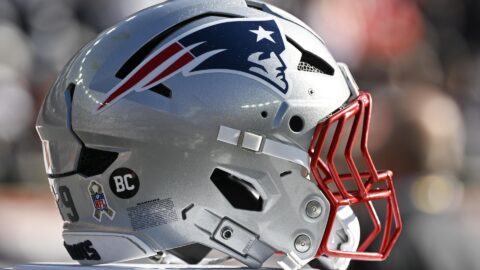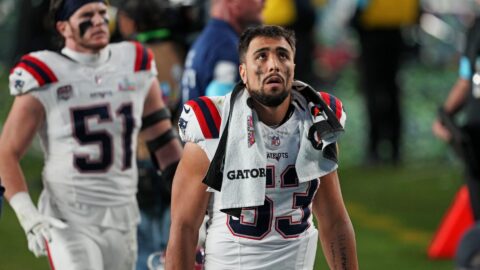It takes a special person to leave the relative cushiness of the NFL for the U.S. Army Rangers, especially in a time of war. It takes someone with a different set of priorities to give up a $3.6 million contract for a $20,000 annual stipend. It takes someone with courage, integrity and incredible honor.
It took someone like Pat Tillman.
Veterans Day is one of the days of the year on which we honor those who have served and those who are currently serving our country.
All week, ESPN has been showing clips of our American sports heroes — people like Tom Brady, LeBron James, Peyton Manning, Candace Parker, Jeff Gordon and more — saluting the "real" heroes, the women and men of our armed services. They broadcast Mike and Mike in the Morning live from the USS New York. They shot SportsCenter on Wednesday from West Point. They've shown features on Heisman Trophy-winning Navy quarterback Roger Staubach; they've spoken with Rocky Bleier, who was wounded in Vietnam but came back to win four Super Bowls with the Steelers; and they've interviewed a trio of ex-West Pointers in coaches Bob Knight, Bill Parcells and Mike Krzyzewski. They've even put together a list looking back on some of the most patriotic moments in U.S. sports history. It's a wonderful set of tributes honoring an impressive group of sports figures.
Of course, there have been many former athletes who served in times of war, as well. We've all heard the stories about what Ted Williams' career numbers might have been if he hadn't lost three seasons to World War II and parts of several more while serving in Korea. Joe DiMaggio, too, joined the Army in 1942 after seven All-Star seasons in New York, served through the end of the war, then returned to help the Yankees win four World Series crowns between 1947 and '51. Similarly, Indians great Bob Feller missed three seasons smack dab in the middle of his career because he enlisted just days after Pearl Harbor.
And those are just three of the Hall of Fame baseball players. There is a multitude of sports heroes — from football and basketball to bobsled and polo — worth remembering and honoring, and their service ranges from World War I to the ongoing conflicts in Iraq and Afghanistan.
But there's something about Pat Tillman that stands out to me.
Maybe it's the fact that so many youngsters — and, let's face it, adults — wish more than anything that they could be professional athletes. There's plenty of allure in getting paid millions of dollars a year and being a celebrity, all while playing a game that you love. Yes, they loved the game back in Teddy Ballgame's day, but they didn't make close to as much money and that was a different war in vastly different times in a vastly different America.
But being beloved by millions and making millions more wasn't enough for Tillman.
After a terrific four seasons at Arizona State — he posted a 3.84 GPA and graduated in three and a half years — he was taken in the seventh round of the 1998 draft by the Arizona Cardinals. He played four years for the Cardinals. In 2000, his finest season as a pro, Tillman made 155 total tackles, 1.5 sacks, two forced fumbles, two fumble recoveries and an interception.
But following the Sept. 11, 2001 attacks, Tillman had a change of perspective. After the 2001 season, instead of returning to the Cardinals, he turned down their three-year, $3.6 million contract offer and enlisted in the U.S. Army.
Everyone knows what followed.
He was deployed to Iraq and took part in the initial invasion of Operation Iraqi Freedom. He then finished Ranger School and was later redeployed to Afghanistan. On April 22, 2004, he was killed by friendly fire while on patrol.
Let's get the semantics out of the way. There's a huge difference between a baseball or football field and a legit battlefield. You read every day about this or that sporting event turning into a metaphorical "battle" between the two sides. We all know that the competition in sports doesn't come close to the seriousness, meaning or significance of a real-life battle between two sides — especially when there are guns being pointed.
As such, I've always seen those who have served in our armed forces as heroes. Growing up playing and watching sports, shielded from major international conflict by the relative peace of the ‘80s, I have always put athletes atop my personal hero hierarchy. But despite having known and seen many truly amazing athletes in my day, even with their unflappable brilliance on the playing fields, their ability to handle pressure pales in comparison to that of the members of our armed forces. I'm impressed by great athletes, but I'm in awe of current and former soldiers.
Of course, the closest I've been to a battlefield was fall leaf-peeping a few years ago in Harpers Ferry, W. Va. So I'm not sure I can adequately pay tribute to a man of Tillman's stature and distinction. I'll leave that task to USA Today's Nate Davis, a great football writer and a former Army Ranger. His award-winning piece on Tillman just hours after his death is a must-read for anyone who misuses the term "hero" when referring to a sports star. Please read it.
Sadly, we in the United States recently suffered through another tragic day, the loss of 13 soldiers in a shooting rampage at Fort Hood, Texas. During a memorial service on Tuesday, President Obama's words rang true not only for the victims there, but the soldiers who have perished anywhere while serving this country.
"Your loved ones endure through the life of our nation," Obama said. "Their memory will be honored in the places they lived and by the people they touched. Their life's work is our security, and the freedom that we too often take for granted. Every evening that the sun sets on a tranquil town; every dawn that a flag is unfurled; every moment that an American enjoys life, liberty and the pursuit of happiness — that is their legacy."
He also made mention of Veterans Day.
"It is a chance to pause, and to pay tribute," he said. "For history is filled with heroes. You may remember the stories of a grandfather who marched across Europe; an uncle who fought in Vietnam; a sister who served in the Gulf. But as we honor the many generations who have served, I think all of us — every single American — must acknowledge that this generation has more than proved itself the equal of those who have come before.
"We need not look to the past for greatness," he said toward the end of his speech, "because it is before our very eyes."
We see and hear about real heroes like Pat Tillman risking (and too often sacrificing) their lives for the betterment of ours every day. Greatness like that is immeasurable even though it really is "before our very eyes." So today and every day, thank the veterans you know for what they've done for the past, present and future of this country. And always remember it.
"I'll never forget Pat Tillman," Davis wrote in the preface to his column. "And I'll never forget those cut from the same bolt of cloth that he was. I hope you don't either."



